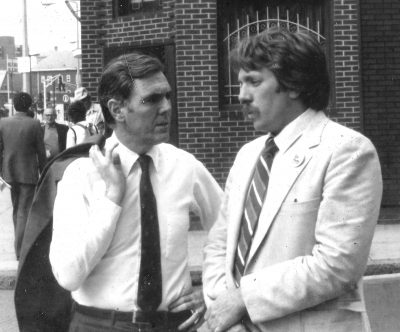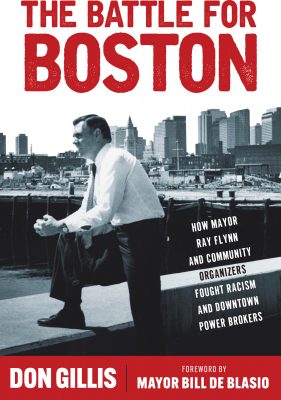From helping set up neighborhood kids with summer jobs to bringing “heroes” from the Boston Celtics to play basketball with them, Former Boston Mayor Ray Flynn always leveraged his connections with significant community members to uplift others.
“Everybody has a good heart,” Flynn said. “They have to be invited in to share their good heart with people less fortunate, and I found that they really wanted to do that.”

Flynn’s tenure as mayor served as the basis for former Boston University professor Don Gillis to write his book, “The Battle for Boston: How Mayor Ray Flynn and Community Organizers Fought Racism and Downtown Power Brokers,” which will be published May 6.
Gillis said the book explores how Flynn’s administration marked a shift toward fighting for Boston’s working class.
“The interests are the people of Boston and for the benefit of low, moderate, working poor people in the city, as opposed to the development community,” Gillis said. “That was a fundamental change that he led [in] his 10 years in office.”
Gillis organized housing tenants in Fenway for improved living conditions and increased resident involvement, especially among the young people who lived there. He received his master’s degree in community sociology from Boston University and continued working in public housing — leading advocacy for the D Street Project, a multifamily home in South Boston.
There, Gillis said he met then-City Councilor Flynn, a public housing and tenants’ rights advocate. Flynn said he recognized Gillis’ commitment to advocacy when he ran for mayor in 1983.
“Don had a pretty good sense of what I have been doing most of my adult life,” Flynn said. “I approached him and asked him if he would join my administration.”
Gillis spent several years as Flynn’s director of neighborhood services before returning to BU in 2015 to pursue a doctorate in sociology.
His dissertation on progressive leadership in Boston later became the foundation for The Battle for Boston, an ethnographic study that examines how mayoral administrations can shape cities.
“Can mayors make a difference in issues of quality of life, economy, poverty, inequality, housing?” Gillis said. “How do you get into power, and when you have the power, how do you use it?”
Before politics, Flynn was a basketball player at Providence College in the 1960s and, after college, was the first white player to join the Roxbury Bruins basketball team.
He said his time playing sports informed his approach to racial tensions in Boston, particularly following the South Boston busing and drug crises. “Teamwork and unity and getting along with everybody” were key values that informed Flynn early in his life, he said.
Flynn said he organized many youth programs before and during his tenure as mayor to bring the community together, such as the Boston Neighborhood Basketball League.
Gillis said as mayor, Flynn did not tolerate racial violence, spearheaded integration in public housing and provided economic opportunities to people of color.

Flynn said he became known as the “mayor of the neighborhood” and secured linkage policies, which required downtown commercial projects to include a portion of affordable housing.
“Those are the people that I wanted to bring together, the neighborhoods versus the downtown and the powerful interests versus the poor and marginalized,” Flynn said. “It became one city.”
Flynn worked alongside community organizations to improve the city.
Physician Jim O’Connell, founder and president of Boston Health Care for the Homeless Program, said Flynn was BHCHP’s “guardian” as the program got started. Flynn helped City Hall obtain a grant to fund the BHCHP.
“What was really important for programs like ours is to be accepted into the mainstream, rather than seen as a separate system of care for homeless people,” O’Connell said.
O’Connell said Flynn integrated BHCHP with Boston Medical Center and Massachusetts General Hospital, ensuring BHCHP would be accepted at shelters around Boston and turned homelessness from a police issue into a public health issue.
“The seeds of what we do in our program … were clearly sewn during Mayor Flynn’s time,” O’Connell said.
Gillis said Flynn’s mayoral tenure set a progressive standard for future administrations to look out for the working class.
“His legacy is really about being the mayor of the poor and working class, bringing people in the city together, bringing the city together racially, and then in respects, economically,” Gillis said.
Flynn said he hopes readers of Gillis’ book learn that joining community groups is the best way to work together with people on issues of common ground and make a difference in their area.
“The issues that people share in common are far more important and far greater than those narrow issues that divide people,” Flynn said.
Gillis said the book offers a “roadmap” to keep development in Boston moving in a progressive direction. He hopes readers understand what both Flynn’s administration and community activists alike did.
“This is about them and him, because one of them alone would not have been able to get done what got done,” Gillis said. “We didn’t have that partnership in the past, and I think that putting that in place was critically important.”
Now, Flynn values getting to hear firsthand how life has changed for people in the neighborhoods since his mayorship, he said.
“My day has come and gone, and this, to me, is the legacy. It’s in them,” Flynn said. “My future is in believing in those people and being proud of those people for doing what they’re doing now, and I’m glad that I was able to make a small contribution to that.”





















































































































